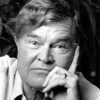Paul Fussell

Paul Fussell
Paul Fussell, Jr.was an American cultural and literary historian, author and university professor. His writings cover a variety of topics, from scholarly works on eighteenth-century English literature to commentary on America's class system. Fussell served in the 103rd Infantry Division during World War II and was wounded in fighting in France. Returning to the US, Fussell wrote extensively and held several faculty positions, most prominently at Rutgers Universityin New Brunswick, New Jersey, and at the University of Pennsylvania in Philadelphia,...
NationalityAmerican
ProfessionHistorian
Date of Birth22 March 1924
CountryUnited States of America
I find nothing more depressing than optimism.
Anybody who notices unpleasant facts in the have-a-nice-day world we live in is going to be designated a curmudgeon.
Americans are the only people in the world known to me whose status anxiety prompts them to advertise their college and university affiliations in the rear window of their automobiles.
Those who fought know a secret about themselves, and it is not very nice. They have experienced secretly and privately their natural human impulse towards sadism and brutality ... Not only did I learn to kill with a noose of piano wire put around someone's neck from behind, but I learned to enjoy the prospect of killing that way.
I am working on a book urging the beating to death of baby whales using the dead bodies of baby seals.
Anyone telling about his travels must be a liar, . . . for if a traveler doesn't visit his narrative with the spirit and techniques of fiction, no one will want to hear it.
Travelers learn not just foreign customs and curious cuisines and unfamiliar beliefs and novel forms of government. They learn, if they are lucky, humility.
Those who fought know a secret about themselves, and it is not very nice.
Before the development of tourism, travel was conceived to be like study, and it's fruits were considered to be the adornment of the mind and the formation of the judgment.
Exploration belongs to the Renaissance, travel to the bourgeois age, tourism to our proletarian moment.The explorer seeks theundiscovered, the traveler that which has been discovered by the mind working in history,the tourist that which has been discovered by entrepreneurship and prepared for him by the arts of mass publicity.If the explorer moves toward the risks of the formless and the unknown, the tourist moves toward the security of pure cliché. It is between these two poles that the traveler mediates. ...
Wars damage the civilian society as much as they damage the enemy. Soldiers never get over it.
If we do not redefine manhood, war is inevitable.
The middles cleave to euphemisms not just because they're an aid in avoiding facts. They like them also because they assist their social yearnings towards pomposity. This is possible because most euphemisms permit the speaker to multiply syllables, and the middle class confuses sheer numerousness with weight and value.
All the pathos and irony of leaving one's youth behind is thus implicit in every joyous moment of travel: one knows that the first joy can never be recovered, and the wise traveller learns not to repeat successes but tries new places all the time.